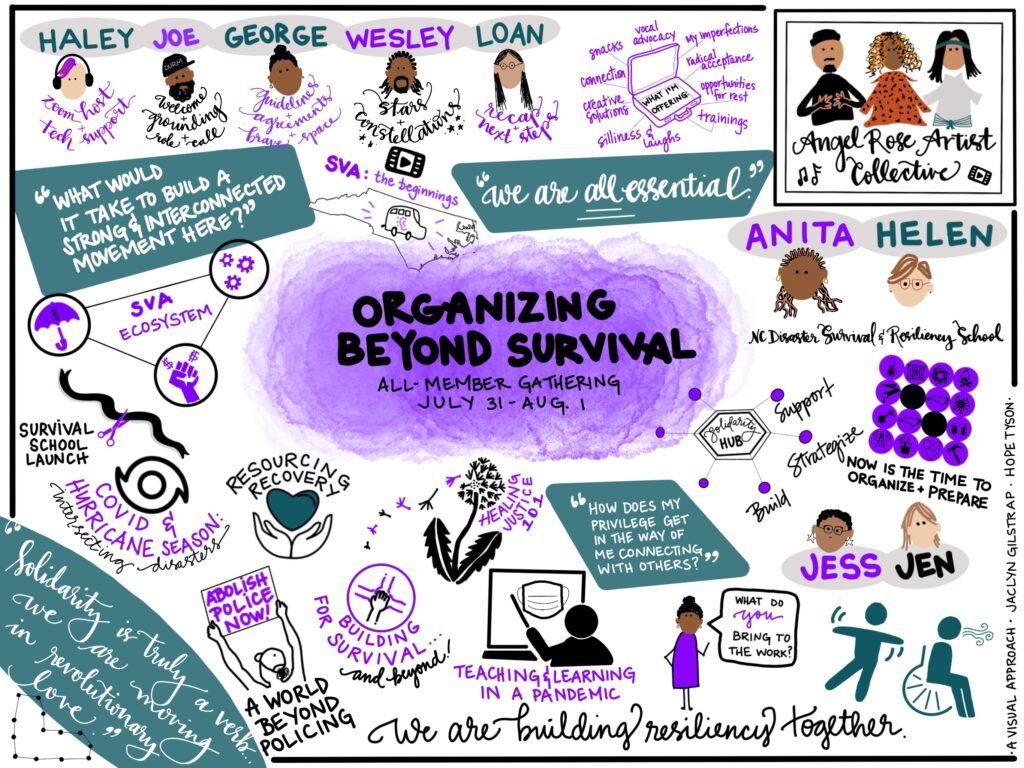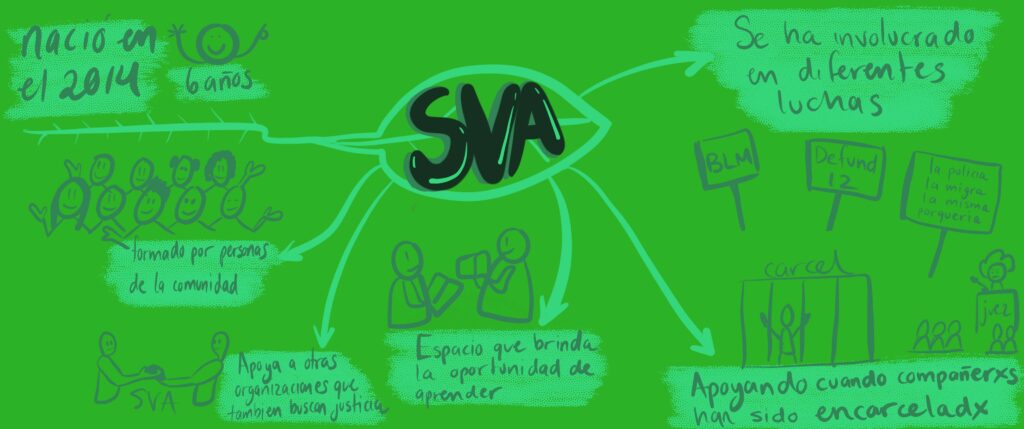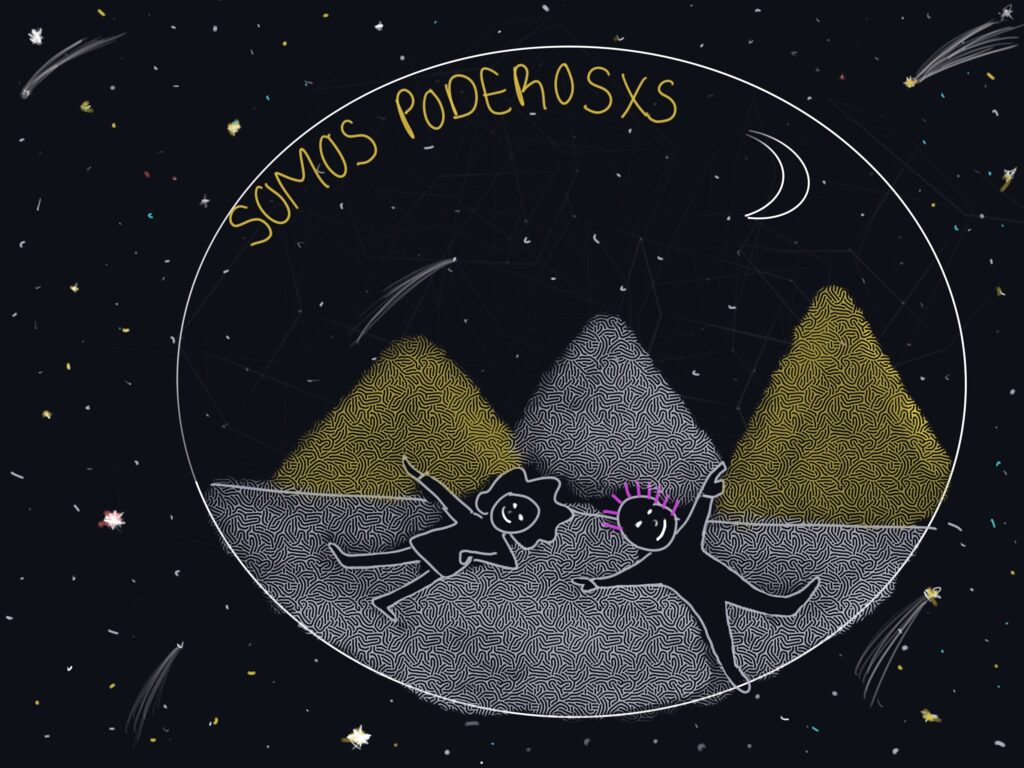
Visual Notes by Hope Tech
In August, we held our first-ever digital All Member Gathering (AMG), an annual gathering that brings together SVA fiscally sponsored projects and programs. AMG serves as a relational space where we can dig into shared vision, assessment, and strategy together! The theme for AMG this year was Solidarity in Resistance, Organizing Beyond Survival.
We bought together over a dozen groups, organizations, and collectives for two full days of workshops from July 31st – Aug 1st. Thank you to all our attendees & partners in this struggle: NoCap 2020, Durham Beyond Policing, Angel Rose Artist Collective, LGBTQ Center of Durham, Movement to End Racism and Islamophobia, Shipshowz, Migrant Roots Media, Community Alliance for Public Education, There’s Still Hope, NC Climate Justice Collective, Robeson County Cooperative for Sustainable Development, We Are Family, Down East Coal Ash Environmental & Social Justice Coalition, Queer Doula Network, Franklin Center At Bricks.

Visual Notes by Samantha Gomez
We are grateful for the abundance of knowledge present, ranging from workshops on somatics and self care to surviving natural disasters to defunding the police. Thank you to all our amazing facilitators, workshop leaders, and tech support team.
During breaks, we watched both hilarious and emotionally moving drag performances by the Angel Rose Collective, a Queer Mobilization Fund grantee. In one session, we received a teaser from the brand-spanking-new NC Disaster Survival & Resiliency School, a digital platform for building survival skills and resiliency practices. Watch below:
It’s hard to believe how much joy and learning and anger and laughter we shared, despite our distance. There’s many, many more moments we wish to highlight but we’ll leave just this last one, a speech by Wesley Morris, SVA’s Director of Programs and Strategy.
My name is Wesley Morris, he/him pronouns. I come to you today from Mississippi, but I am a North Carolinian and Southerner at my heart. I want to share, before I get too far into it, a poem by Lucille Clifton.
If any of you have heard of her, you know she is an amazing woman of words. She grew up in western New York, near Buffalo. She worked as a government clerk and office assistant. Her first book “Good Times,” was rated one of the best books of 1969 by The New York Times.
I share her work as a way to start talking about stars and constellations—those things that you might’ve heard about or we might’ve heard about when we were kids, and maybe we forgot a little bit about them. I want to bring some of that back to our home.
Here’s “Won’t You Celebrate With Me”:
won’t you celebrate with me
what i have shaped into
a kind of life? i had no model.
born in babylon
both nonwhite and woman
what did i see to be except myself?
i made it up
here on this bridge between
starshine and clay,
my one hand holding tight
my other hand; come celebrate
with me that everyday
something has tried to kill me
and has failed.
This poem came to me at a time in my life where I was a coach, a facilitator, a mentor, a teacher, a preacher, a chaplin. Yes, all of those things in my one body. And I needed to hear this poem because, at the time, like we’re living in now, there was a heightened crisis that my body was experiencing. But today, here at AMG 2020, we have come to celebrate. Celebrate through the scars of scarcity, through the burden of being called bothersome and being reduced to redundancy when the very systems that we fight operate so damn stubbornly. But today we gather, and all of us are here at what I now consider one of my organizing homes, or hubs, SVA.
Solidarity moments are essential to movement. So whether it’s gathering around firesides, eating meals together, singing on, or off, key together, our humanity yearns to be connected. So we are excited and glad that you have chosen to take the time today to be here with us.
So let me start this talk about stars. You see, the ancients would construct how they move, play, and actually plan around the position of stars. I mean, we see the stars today but sometimes it’s difficult to truly see them if you’re living in the city. I spent some time in New York City and I almost forgot that there were stars because of the artificial light pollution that disturbs our very view of the things that are essential. But much less, constellations are very difficult to see if we do not see the stars. So direction and orientation about what to do and where to go becomes very difficult.
But recently, I’ve been here in the rural South, and I currently bring you greetings like I said from Mississippi, and I’ve had the blessing of seeing the stars more clearly again. Asking my elders with socially distanced visits to their porches about the wisdom of how they got over and how did they pass through the wars, the tragedies, the triumphs, personal and societal suffering, and still hang in there for the long haul. Our home towns, our families, our chosen families that are in rural areas that have less of the public attention but oftentimes have deeper roots into the soul of the earth are in urgent need of refreshing.
We know what the problem is, and the more we dig into the roots of our problems, the more clear and conscious we become to the bright solutions. So I want to share this. Each of us, in our own way, know, and have been impacted, by interlaced, interwoven, and interlocking systems of globally constructed capitalism. Exploitative self interest and the idea of white supremacy, nakedly running around causing named and unnamed violences around the globe. The night, the darkness of pandemic, wars and racism and sexism and gendered weapons of violence and suppression of indigeneity and harm towards how we simply show up and be ourselves in this world every single day.
In times of heightened crisis I was always taught to sharpen my questions if I wanted to be what some would call “solutionary”. Word to the poet Sunni Patterson for those that know who that is and her work. So let us turn to some relevant questions. Where do we go from here? Where are we going? Have any of you ever ridden in a car and just asked the person “Where are we going? Why did you turn that way? That’s not how to get there.” But there is yet another profound layer to this question. How do we get to where we want to go?
One thing we should take with us is a three-legged stool that has knowledge, access, and courage. There is not one leg of this stool that can survive or be dutifully employed without the other. Where we are is also part of an extension to where we can go and will go. So let me say it this way. Oftentimes the limits of our imagination often find us at the brink of our knowledge. And in this country, our imaginative skies of liberation have been impacted by the same groups that designed the exploitative metrics of our existence.
So we reject toxic environments that attempt to cloud our imagination, and unfortunately some new constellations are now contained in my sky. Ptolemy’s labels will not do for me, it’s not Orion’s Belt, but it is Trayvon’s hoodie. It would seem there is no Little Dipper, only little Tamir or little Aiyana. No Big Dipper but tall Mike Brown, no Ursa Minor but a lock of Sandra Bland’s hair, no Scorpius but Layleen Xtravaganza Cubilette-Polanco and Tony McDade. Say their names.
I’m telling you, when we see our names, our people, in this American night sky, we find ourselves in urgent need to satisfy our wanting spirits. And to dig deeper for wells of hope, joy, defenders of truth, queering insufficient normalized responses, operating with radical kindness, authorizing forgiveness for ourselves, recognizing pasts, presents, and futures. We are in many ways living in the Parable of the Sower, as Octavia Butler etched into the hieroglyph of Afro-futuristic dreams. We reside in a state and a region where most vulnerable are looking to the sky and touching the earth, in a very real sense looking for answers on this bridge between starshine and clay.
So when we tear down Confederate monuments, we replace them with stories of courage, triumph, and provide course correction for the revisionist histories that are told. When organized people amplify the demands that arise from the concrete needs of community, we are merely the whistle that the power of the people blows through. The fighters, frontliners, mobilizers are doing what is imperative for mass movements to be sharp and critical. Looking beyond policing and surveilling and inviting the multiplicity of spirituality. Faith, togetherings as I call it, as I have learned that our unity beyond sector and shape is powerful.
The writer Dorothee Sölle says, “The more people anticipate the elimination of suffering the less strength they have actually to oppose it. Whoever deals with his personal suffering only in the way our society has taught him—through illusion, minimization, suppression, apathy—will deal with societal suffering in the same way.” Communities who endure unearned suffering have what Sölle calls a dangerous memory. I’m gonna be like a preacher: everybody say dangerous memory. That lies right beneath the surface and is ripe for revolutionary action. That’s why Lucille Clifton again calls us to a moment of remembrance in a poem titled “why some people be mad at me sometimes.” Let me just get a little bit of spirit fingers if people be mad at you sometimes.
they ask me to remember
but they want me to remember
their memories
and i keep on remembering
mine.
I’ll move swiftly to my close. Well if only for a few moments, I now want to talk about the interlaced, interwoven, and interlocking wisdoms that I want to offer to meet this moment. Organizing beyond survival and solidarity, resistance, transformation, accessibility, resources, equity, technology. Our stars and our constellations have to stay connected. The wisdom is in the room, y’all. Everyone here as part of the AMG two-day gathering is the wisdom. We get to connect the stars, we get to connect to each other, we simply reconnect and keep this movement moving.
Stars alone are difficult to make meaning of. Yet when they are connected, it presents the same challenge to those that would rather have you lost. When we connect, we become community. Isolation and individualization are tools of domination, so I encourage us to continue to use collective action and self determination as part of our power.
Lastly, SVA’s support and role in this is to be and to provide and to be of a service to you. Solidarity is truly a verb. So glad that you are here, we’re still moving forward, moving smarter, moving with revolutionary love, love, love, and that’s a chant that I love to say so much. Revolutionary love, love, love. We’ll have to share that one time. But from farming, to schooling, abolition work, transition and change, immigration and migration support, intergenerational seasoning (let’s say that again: intergenerational seasoning), honoring sacred space, we are going to need it all. I am reminded it is truly our duty to fight for our freedom. It is our duty to win. We must love and protect one another. We have nothing to lose but our chains. Words to Assata.
So let’s stay connected because as the same with nature, moons do rise, suns do set and the world still turns. With all that movement, the stars, whether visible or not shining at all, are still connected behind it all. You are shining, you are the joy, you are the hope that reminds the hopeless that all things are possible. May our imaginations remain free because some people still look to the stars for answers and guidance on this bridge between starshine and clay.
So I’ll leave you with this second verse to the most popular song that I know. So I hope y’all feel it. We gotta go back to elementary school. “When the blazing sun is gone, when there’s nothing the sun shines upon, then you show your little light.” Y’all didn’t even know this verse was here, but it says, “Twinkle, twinkle, through the night. Twinkle, twinkle, little star, how I wonder what you are.”
Bless y’all, love.

Visual Notes by Samantha Gomez
Credit:
- Featured Image – Visual Notes by Hope Tech
- Spanish Visual Notes by Samantha Gomez
